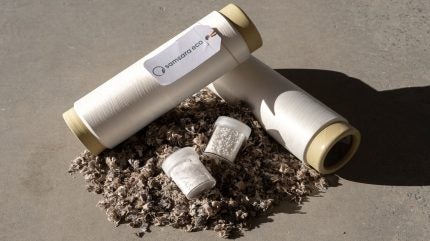
The long-term contract may see Samsara Eco’s materials constituting about 20% of Lululemon’s total fibre portfolio, aiding the company’s aim to increasingly utilise preferred materials by the year 2030.
The recent declaration is an extension of an established partnership between the two entities.

Discover B2B Marketing That Performs
Combine business intelligence and editorial excellence to reach engaged professionals across 36 leading media platforms.
The partners introduced the inaugural enzymatically recycled nylon 6,6 product sample last year and launched Lululemon’s premier enzymatically recycled polyester item with a special edition Packable Anorak
These products show the potential for enzymatically recycled textiles to maintain the expected aesthetic, texture, and performance standards of lululemon’s merchandise.
Lululemon chief supply chain officer Ted Dagnese said: “Scaling circular materials requires bold partnerships and a shared commitment to rethinking how our industry operates. Our partnership with Samsara Eco is a powerful example of what’s possible when innovation meets collaboration.

US Tariffs are shifting - will you react or anticipate?
Don’t let policy changes catch you off guard. Stay proactive with real-time data and expert analysis.
By GlobalData“As we work toward our 2030 impact goals, we’re taking a diversified approach —investing in multiple partnerships to advance solutions and help reduce our reliance on fossil-fuel derived resources. Together with our partners, including Samsara Eco, we’re helping to turn our vision of a circular model into a reality.”
Polyester and nylon, constituting roughly 60% of global fibre production, are two widely used fibres in the textile industry.
Samsara Eco has positioned itself in enzymatic recycling of nylon 6,6 products. The company also processes polyester and assorted plastics and fibres using engineered enzymes that decompose plastic back to its fundamental components. These can then be reintegrated into standard manufacturing workflows to produce new items.
Samsara Eco founder and chief executive officer Paul Riley said: “Our expanded partnership with Lululemon represents a strong step forward to help create a fully circular ecosystem and further highlights the industry’s commitment to transition to more circular materials.
“The technology to make circular materials is not a pipe dream – it is here, ready for adoption by forward-thinking companies. I’m incredibly optimistic about how we will help fuel circular apparel over the next decade with Lululemon.”
To bolster commercialisation initiatives, Samsara Eco is set to inaugurate a new facility in Jerrabomberra, New South Wales, which will enhance production capacity and further develop its EosEco enzyme technology.
Additionally, plans are underway for opening an international commercial plant in 2028.





